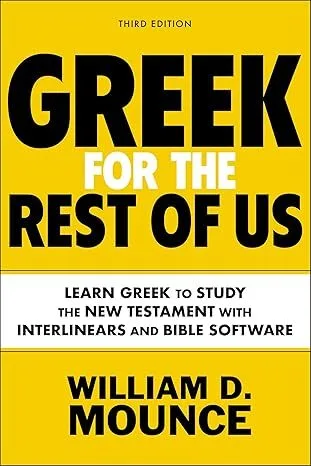Pronunciation Guide: dee-eg-i’-ro (with a rolled ‘r’ and emphasis on the second syllable)
Basic Definition

Key Information
διεγείρω

Strong’s Entry
g1326
Strong’s G1326: διεγείρω (diegeirō) fundamentally means “to wake up completely” or “to arouse thoroughly.” It carries the vivid imagery of being fully awakened from sleep or stirred to action from a dormant state. The word conveys a powerful sense of transitioning from inactivity to heightened alertness or engagement, often with a sense of urgency or divine purpose behind the awakening.
Etymology and Morphology
- Part of Speech: Verb
- Root Components: Compound of διά (dia, “through, thoroughly”) + ἐγείρω (egeirō, “to awaken, to raise up”)
- Language Origin: Classical Greek
- Primary Usage: Narrative sections, particularly in miracle accounts and discipleship contexts
- Voice: Typically found in active and passive forms
- Tense: Primarily aorist and present tenses in biblical texts
διεγείρω Morphology:
- διεγείρω (present active indicative, 1st person singular) – I thoroughly awaken
- διεγείρεις (present active indicative, 2nd person singular) – you thoroughly awaken
- διεγείρει (present active indicative, 3rd person singular) – he/she/it thoroughly awakens
- διήγειρα (aorist active indicative, 1st person singular) – I thoroughly awakened
- διεγέρθητι (aorist passive imperative, 2nd person singular) – be thoroughly awakened!
- διεγερθείς (aorist passive participle, masculine nominative singular) – having been thoroughly awakened
Origin & History
The compound verb διεγείρω emerged from classical Greek literature where it initially described the physical act of waking someone completely from sleep. In works like Euripides’ “Hecuba” (900), it appears in contexts of being thoroughly roused or alarmed. The prefix διά intensifies the base verb ἐγείρω, emphasizing completeness or thoroughness in the awakening.
In the Septuagint (LXX), διεγείρω appears in contexts like Habakkuk 3:9, where it describes Yahweh “thoroughly arousing” His bow—a vivid metaphor for divine action and judgment. The word took on spiritual dimensions in Jewish Hellenistic literature, where it began to signify not merely physical awakening but also spiritual alertness or divine intervention that stirs people to action. By the time of the New Testament, the word carried both literal and metaphorical connotations of thorough arousal or stimulation—whether from sleep, spiritual lethargy, or inaction.
Expanded Definitions & Translation Options
- Complete Awakening – A thorough rousing from physical sleep, with emphasis on the completeness of the awakening
- Spiritual Arousal – A divine stirring of one’s spiritual consciousness or attention
- Mobilization to Action – Being prompted or spurred to engage in responsive action
- Resurrection/Raising Up – In some contexts, carries connotations of raising from death (physical or spiritual)
- Stirring of Natural Elements – Used of wind or waves being aroused to action
διεγείρω Translation Options:
- “To rouse thoroughly” – Captures both the completeness (διά) and the awakening (ἐγείρω) elements of the word, applicable in physical and metaphorical contexts
- “To stir up completely” – Emphasizes the comprehensive nature of the arousal, particularly useful in contexts describing emotional or spiritual activation
- “To awaken fully” – Highlights the completeness aspect while maintaining the core meaning of awakening from dormancy
- “To stimulate to action” – Best suited for contexts where the awakening leads directly to responsive movement or behavior
- “To arouse from lethargy” – Particularly effective for metaphorical contexts dealing with spiritual complacency or inattentiveness
Biblical Usage
διεγείρω appears strategically in the New Testament, often at pivotal moments when divine intervention breaks through human limitations. Its first appearance in Matthew 1:24 shows Joseph being “thoroughly aroused” from sleep after receiving angelic instruction—a physical awakening that led to immediate spiritual obedience. This pattern continues throughout Scripture, where διεγείρω frequently signals a dramatic transition from passivity to active engagement with divine reality.
The word appears powerfully in the Gospel accounts of Jesus calming the storm (Mark 4:38-39; Luke 8:24), where the disciples “thoroughly arouse” Jesus from sleep, only for Him to demonstrate divine authority by “rebuking” the thoroughly aroused (διεγερθεῖσαν) sea. This juxtaposition reveals the word’s theological weight—both human urgency and divine power can “thoroughly awaken” different elements of creation, but with dramatically different consequences.
- “Then Joseph awoke [διεγερθεὶς] from sleep and did as the angel of the Lord commanded him.” Matthew 1:24
- “And they came and woke [διεγείρουσιν] Him, saying, ‘Teacher, do you not care that we are perishing?'” Mark 4:38
- “They came to Jesus and woke [διήγειραν] Him up, saying, ‘Master, Master, we are perishing!'” Luke 8:24
- “For this reason I intend to always stir you up [διεγείρειν] by way of reminder.” 2 Peter 1:13
- “This is now, beloved, the second letter I am writing to you; in them I stir up [διεγείρω] your sincere mind by way of reminder.” 2 Peter 3:1
- “For He commands [διεγείρει] even the winds and the water, and they obey Him.” Luke 8:25
- “As a result, the sea began to be stirred up [διεγείρετο] because a strong wind was blowing.” John 6:18
Cultural Insights
In the ancient Mediterranean world, sleep was understood not merely as a biological necessity but as a vulnerable state during which divine communication often occurred. The act of being “thoroughly awakened” (διεγείρω) carried significant cultural weight, especially when that awakening was prompted by divine messengers or visions. This cultural understanding illuminates why Joseph’s διεγερθεὶς (thorough awakening) in Matthew 1:24 is immediately followed by obedience—his physical awakening symbolized spiritual alertness and receptivity to divine instruction.
The imagery of διεγείρω also connects to ancient Jewish understandings of spiritual vigilance expressed in texts like the Shema (Deuteronomy 6:4-9), where Israel is commanded to maintain constant spiritual awareness. The rabbinical tradition emphasized “awakeness” (עוּר – ur) as a spiritual virtue, contrasting with the “slumber” of idolatry or disobedience. When Jesus was διεγείρουσιν (thoroughly awakened) by His disciples during the storm, the cultural subtext would have been readily apparent to Jewish readers—they were not merely waking their teacher but appealing to divine vigilance in the face of mortal danger, ironically failing to recognize that the divine presence was already with them in the boat.
Theological Significance
διεγείρω powerfully illustrates the interplay between divine initiative and human response in Scripture. When God “thoroughly arouses” individuals from spiritual slumber—as with Joseph in Matthew 1:24—the awakening brings clarity, purpose, and immediate obedience. This reflects the pattern established throughout biblical revelation where God’s arousing voice (“Adam, where are you?”) initiates transformation in human consciousness and behavior.
The Messiah’s authority over creation is dramatically displayed when He responds to being διεγείρω (thoroughly awakened) by the disciples by in turn rebuking the διεγερθεῖσαν (thoroughly aroused) sea. This theological juxtaposition reveals Jesus as the One who not only experiences human limitations like sleep but transcends them with divine authority. The same voice that spoke creation into existence (Genesis 1:3) now speaks it into submission, demonstrating that while humans may attempt to thoroughly arouse God to action, it is ultimately God’s arousing word that brings order from chaos.
Peter’s use of διεγείρω in his epistles (2 Peter 1:13, 3:1) reveals another theological dimension—the ongoing need for believers to be “thoroughly aroused” from spiritual complacency through the continual remembrance of divine truth. Here, διεγείρω functions as a metaphor for sanctification, the process by which believers are increasingly awakened to divine reality and stimulated toward faithful action in response to God’s character and promises.
Personal Application
To embrace the spiritual principle of διεγείρω in our lives requires honest assessment of areas where we may be spiritually dormant or asleep. Just as Joseph was thoroughly awakened and immediately obedient, we too are called to responsive alertness when God’s voice breaks through our spiritual slumber. This might come through Scripture, prayer, circumstances, or the counsel of fellow believers—each serving as God’s instrument to thoroughly arouse us to renewed faithfulness and action.
Consider the areas of your spiritual life where complacency has settled in—perhaps in prayer, Scripture engagement, witnessing, or pursuing justice and mercy. The divine call to διεγείρω invites us not merely to stir slightly but to be thoroughly awakened to the reality of God’s presence and purposes. Like the disciples in the storm-tossed boat, we often attempt to wake Jesus to our urgency when He is actually waiting to awaken us to His sufficiency and authority over every circumstance that threatens to overwhelm us.
Related Words
- ἐγείρω (egeirō) [eh-GEY-ro] – The root verb meaning “to awaken” or “to raise up,” lacking the intensification of διά. Used frequently for resurrection. See G1453
- ἐξεγείρω (exegeirō) [ex-eg-EYE-ro] – “To rouse up” or “to raise up completely,” with emphasis on bringing forth or producing something. Contains the prefix ἐξ- (ex-) which adds the nuance of “out from.” See G1825
- γρηγορέω (grēgoreō) [gray-go-REH-o] – “To be vigilant” or “to stay awake,” emphasizing continuing watchfulness rather than the moment of awakening. Derived from ἐγείρω. See G1127
- ἀφυπνόω (aphypnoō) [af-oop-NO-o] – “To fall asleep,” representing the opposite concept to διεγείρω. Used of natural sleep. See G879
- ἀνίστημι (anistēmi) [an-IS-tay-mee] – “To stand up” or “to raise up,” often used in resurrection contexts similar to διεγείρω but emphasizing the position change rather than the state of awakeness. See G450
Did you Know?
- In ancient Jewish dream interpretation, the manner of awakening (διεγείρω) was considered significant for understanding divine messages. A sudden, complete awakening was often interpreted as indicating the urgency or importance of the dream’s message, which adds depth to understanding Joseph’s experience in Matthew 1:24 where he “thoroughly awakened” and immediately obeyed.
- The medical writings of Hippocrates and Galen used διεγείρω to describe stimulating a patient’s vital functions or arousing someone from unconsciousness, suggesting that the biblical usage might carry connotations of life-giving stimulation beyond mere wakefulness. This medical background enriches our understanding of Peter’s use of the term for spiritual stimulation in his epistles.
- Modern Greek has preserved διεγείρω primarily in formal or literary contexts, where it maintains its classical meaning of “to excite” or “to stimulate thoroughly.” In contemporary Greek Orthodox liturgy, the word appears in prayers asking God to “thoroughly awaken” the faithful to spiritual realities, creating a continuity of usage spanning over two millennia of Greek Christian tradition.
Remember This
διεγείρω captures the divine capacity to thoroughly awaken us from spiritual slumber to transformative action—reminding us that true discipleship begins not with our attempts to rouse God to our agenda but with His gracious awakening of our hearts to His presence and purpose.
Note: While this entry strives for accuracy, readers engaged in critical research should verify citations and keyword occurrences in their Bible translation of choice. For Biblical citations, the F.O.G Bible project recommends Logos Bible software.
Strong's g1326
Add Comment
God's Word is too vast for a single perspective. We all have a story, and as believers we all carry the Holy Spirit who is the Revealer. With this in mind - I would love to read your comments.




